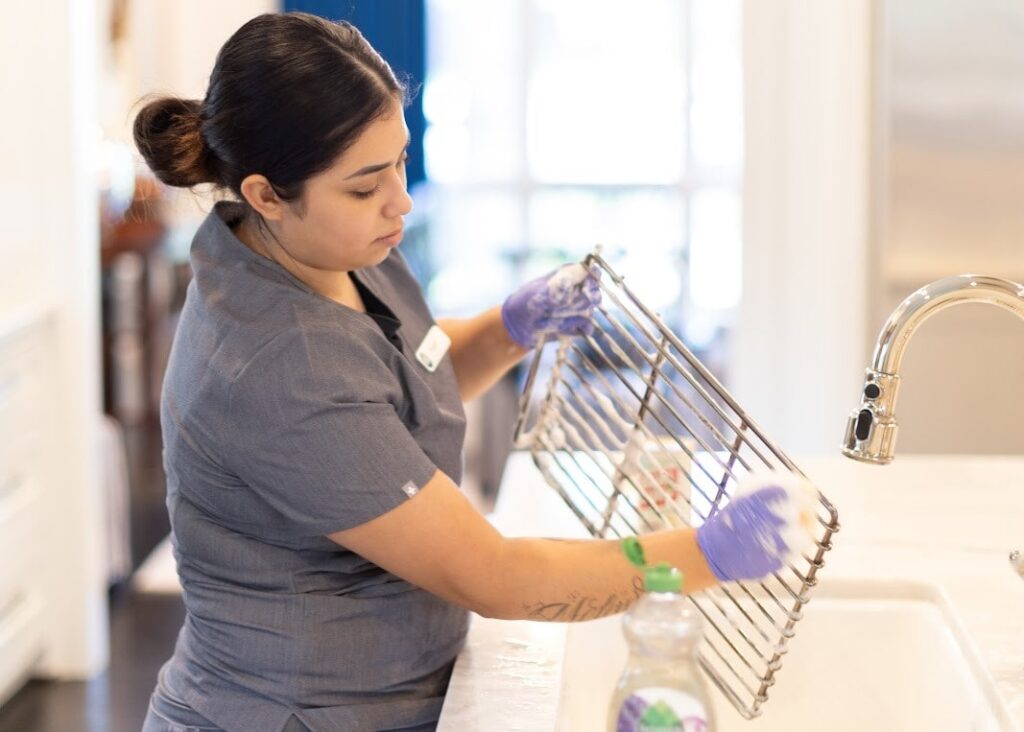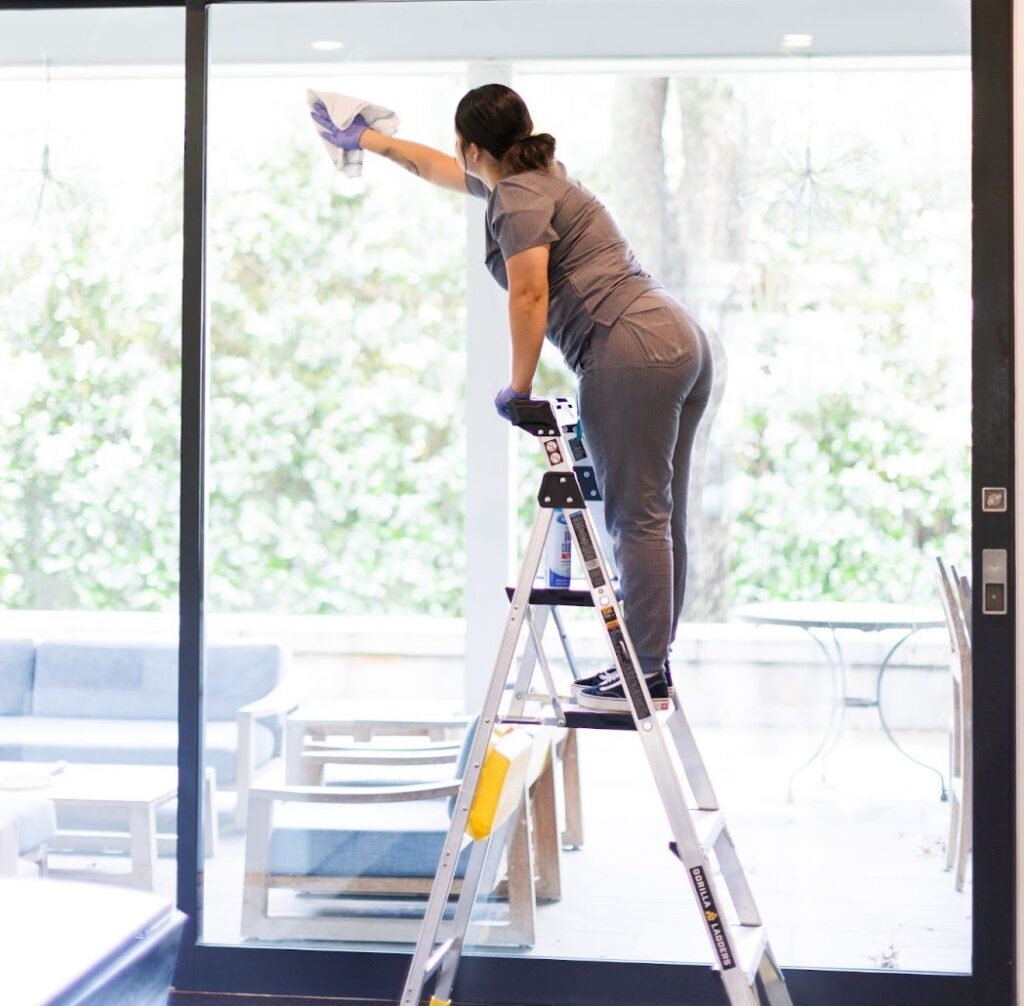How to Clean Countertops and Surfaces – Best Practices for Different Materials

How to Clean Countertops and Surfaces – Best Practices for Different Materials
Keeping countertops and surfaces clean is important to maintain hygiene in your kitchen. After all, it’s where we prepare meals, handle groceries, and organize our everyday equipment. However, cleaning different countertop surfaces needs special techniques and materials. If not done well, you might just end up damaging the countertop surfaces.

Through this detailed guide, we will help you understand each type of countertop and how they have to be cleaned. We also cover how to keep your counters spotless and preserve their natural beauty for a long time.
General Tips to Clean Countertops
When in regular use, countertops go through messy spills and crumbs. This leads to the buildup and growth of bacteria and germs. Wiping down surfaces after each use ensures that doesn’t happen. Now, harsh chemicals and scrubbing can dull out your surfaces and corrode stones like granite and marble over time. To keep your countertops shiny and clean, it is crucial to use non-abrasive and non-toxic surface cleaners like the Seventh Generation Dish Soap.
Cleaning and Polishing Tips for Each Type of Countertop
To ensure that your countertop material doesn’t get damaged over time, it is necessary to understand the material that your countertop is built of and practice material-specific cleaning tips. Here are some safe methods to ensure an easy stain removal process to keep that surface as bright as possible.
Granite Countertops
Granite is a common, durable, and beautiful stone that adds a natural elegance to your home. For daily cleaning, we suggest a non-abrasive, pH-balanced cleaner. Apply a small amount with a microfibre cloth to prevent scratching. Avoid using any alkaline or acidic product. It can strip off the sealant. In addition to daily cleaning, granite countertops also need to be polished with a granite-specific countertop polish. We advise polishing once a month to help keep the surface smooth and shiny.
Marble Countertops
A timeless, elegant stone decorating the house of many, marble is used quite commonly for a variety of surfaces and countertops. But marble is also particularly sensitive to acidic and harsh chemical substances. Instead of a vinegar or lemon-based cleaner, opt for a pH-balanced cleaner. It cleans the surface gently. To prevent staining, wipe any spill immediately — especially if it’s an acidic spill like tomatoes or lemon juice. Marble is also very porous, hence sealing it every 6-12 months is great to create a barrier against any spills.
Stain Removing and Polishing Tips for Granite and Marble Countertops
Since these stones are porous, any stain needs to be immediately wiped off the surface. If the stain is light, gently scrub with a mixture of water and baking soda and cover with cling film. After a while, wipe it off and the stain should be gone. For tougher stains, carefully apply a mixture of baking soda and hydrogen peroxide. Clean it off after a while with a mild, pH-balanced cleaner like Bon Ami.
Pro tip: To polish granite and marble, use a stone-specific polish that is pH-neutral and safe for sealed surfaces. Apply the polish to a clean, soft cloth and rub it in circular motions to buff the surface. Polishing every few months or when the stone gets a little sull helps maintain the natural shine.
Quartz Countertops
A popular choice amongst many due to its durability and low maintenance, quartz is ideal for daily use surfaces. For daily cleaning, wipe down the surface with a microfibre cloth and a non-toxic surface cleaner. Quartz can maintain its shine quite well, however, if you like an extra polished look, use a quartz-specific polish. A non-toxic polish would be ideal as they don’t leave any residue or unpleasant odor after polishing.
Quartz is usually non-porous and generally stain-resistant. However, if you do end up with a stain, wipe it off with a mixture of water and vinegar. Remember to let it sit for a while before wiping it off.
Pro tip: Avoid harsh scrubbing pads. They can scratch and ruin the surface. Alternatively, you can either use a quartz-specific polish or a non-toxic polish spray. Apply a small amount to a soft cloth and buff lightly. Excessive buffing and product can make the surface look duller over time.

Laminate Countertops
Laminate countertops are highly versatile and a common budget-friendly option. However, it does require a decent amount of maintenance and care to maintain its look and durability. For daily cleaning, opt for a mild, non-abrasive cleaner and wipe down the surface with a soft cloth. Laminates are sensitive to water – it can seep into seams and swell up the material. So avoid placing any hot cookware directly on the surface. Laminate is also quite sensitive to harsh chemicals. Our advice is to stick to gentle cleaners to help the countertop look fresh and clean.
Laminate countertops are very sensitive and can be heavily stained if you don’t clean spills right away. Use a paste of gentle dish soap and baking soda to lightly scrub the stained surface. If the stain persists, use a mix of water and vinegar. But avoid using this trick often – it can wear down your countertops quickly.
Although laminate-safe polishes are available, our advice is just to wipe the surface lightly with a soft piece of cloth or kitchen wipes. Remember, excessive usage of polishes can leave a sticky residue – very hard to clean!
Wood Countertops
Wooden countertops add a cozy touch to your kitchen. If you are a cottage-core girl, you probably opted for this rustic feel in your kitchen. But it isn’t easy to maintain the quality of wooden countertops. For starters, wipe down the surface with a mild, wood-friendly cleaner, and make sure to wipe the surface dry with a clean cloth to avoid mold growth. Conditioning the wood periodically is also necessary to maintain its natural luster and avoid moisture seepage.
Stains on wooden countertops can be a bit challenging to remove due to their porous nature. If it is a mild stain, wipe it off with a cloth and dish soap. For tougher stains, use a mix of water and baking soda. It can remove stains efficiently without damaging the wood too much.
Pro tip: Use a food-safe mineral oil or a butcher block oil. The oil helps keep the moisture out and protects the natural luster of the wood. Apply some oil on a soft cloth and wipe it along the grain for a smooth even finish. This prevents any moisture seepage and also the drying of the surfaces.
Stainless Steel Countertops
Stainless steel provides a sleek, modern look to your kitchen. However, it is prone to smudges and fingerprint marks – a point to keep in mind if you have little kids running around the house. The best part of using stainless steel as a countertop surface is that it is low maintenance. For daily cleaning, use a non-abrasive surface cleaner with a soft cloth. Wipe it down and give it that brand-new polished look. When choosing stainless-steel surfaces, opt for trusted, high-quality materials such as BlueScope Steel. Known for its durability, corrosion resistance, and modern finish, BlueScope Steel ensures your countertops and metal accents remain sturdy, stylish, and easy to maintain for years.
For any stubborn stains, use a mixture of baking soda and water and apply in the direction of the grain. Wipe it off with a damp cloth. Also, any polishing spray intended to polish metal works great for stainless steel. Just apply a small amount on a soft cloth and work it in the direction of the grain. Regular polishing maintains a clean, shiny look and reduces the appearance of any smudges or fingerprints.
Pro tip: To avoid wiping streaks, wipe down in the direction of the grain and periodically use a stainless-steel polish to keep the surface shiny and looking brand new!

Maintenance Tips for Long-Lasting Countertops
Regular maintenance ensures the beauty of your kitchen and prevents you from breaking the bank on costly repairs – you know, due to poor maintenance. Here are some tips to maintain the life of your countertops.
- Always use cutting boards to prevent scratches from sharp objects. The ease of not having to wash the cutting board later isn’t worth running the shine of your kitchen surfaces.
- Use a trident or a stand to place your hot cookware on the countertops.
- Wipe any spills as soon as possible. This prevents the stain from seeping through the material making it more stubborn.
- Use non-toxic, non-abrasive cleaners to prevent the wearing of the surface and avoid buildup.
- Reseal porous stone countertops in regular intervals to maintain their condition.
- Consider professional cleaning every once in a while for an in-depth cleaning with proper polishing. Professional housekeepers – like us at Vella – always ensure that your countertops are squeaky clean and are maintained properly.
Conclusion
Cleaning and maintaining countertops and surfaces are essential to preserve the beauty of your hard-earned home. Any material, when the needs of the surface are met, shines bright and stays long. Following our simple instructions with the proper products can go a long way in preserving the lifespan of your countertops.
Vella offers professional housekeepers who understand the nuances and are trained in the specialized knowledge required to maintain your countertops. So, what are you waiting for? Book one of our specialized, customizable services today.